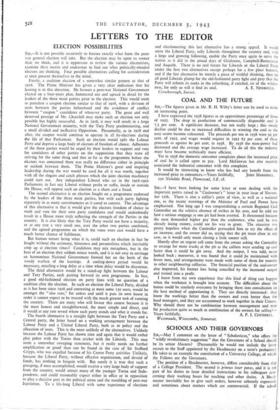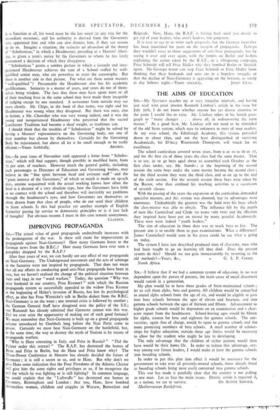SCHOOLS AND THEIR GOVERNORS
Snt,—May I comment on the letter of " Scholasticus," who offers the " wildly revolutionary suggestion " that the Governors of a School should be its senior Masters? (Presumably he would not include the latest recruit to the Staff appointed by the Headmaster on a term's probation.) He takes-as an example the constitution of a University College, of which the Fellows are the Governors.
The position of a Headmaster, however, differs considerably from that of a College President. The second is primus inter pares, and it is not part of his duties to issue detailed instructions to his colleagues con- cerning their working hours for teaching and other duties. A Head- master inevitably has to give such orders, however urbanely expressed, and sometimes about matters which are controversial. If the school is to function at all, his word must be the last word (at any rate for the immediate occasion), and his authority is derived from the Governors who appointed him and who can also dismiss him, if they see reason to do so. Imagine a situation, the reductio ad absurdum of the theory of " Scholasticus," in which a Headmaster, presiding at a Masters' Meet- ing, is given a term's notice by the Governors to whom he has lately announced a decision of which they disapprove.
" Scholasticus " paints a sombre picture in which a juvenile and inex- perienced Headmaster achieves the ruin of a School staffed by well- qualified senior men, who are powerless to avert the catastrophe. But there is another side to that picture. For what are these senior masters " well-qualified "? Presumably the Headmaster also has his academic qualifications. Seniority is a matter of years, and years do not of them- selves bring wisdom. The fact that these men have spent most or all of their teaching lives in the same school may have made them incapable of judging except by one standard. A newcomer from outside may see more clearly. Mr. Chips, in the book of that name, was right and his Headmaster was wrong when they disagreed. But there was once, also in fiction, a Mr. Chowdler who was very wrong indeed, and it was the young and inexperienced Headmaster who perceived that the sacred Lanchester Tradition had become a dead weight, as traditions can.
I should think that the troubles of " Scholasticus " might be solved by having a Masters' representative on the Governing body, not one of their number but chosen by themselves. Certainly let the Governing Body be rejuvenated, but above all let it be small enough to be really



























 Previous page
Previous page